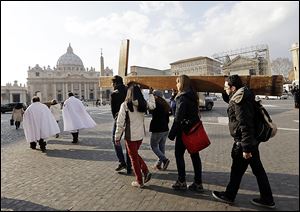
The next Pope
Benedict’s successor will need to share the traits of some of the church’s most famous pontiffs
3/5/2013
Benedict
Benedict XVI has begun his new life as Pope emeritus. So far, he has spent his time in contemplation, prayer, and catching up on TV. Meanwhile, the 115 voting members of the College of Cardinals are about to begin the pragmatic work of selecting the next head of the Roman Catholic Church.
Bookmakers are taking odds on where the next pope will come from. Las Vegas has installed Cardinal Peter Turkson of Ghana as the front-runner, at 2½ to 1. Other handicappers give even odds that Italy will produce the next pontiff.
Ideally, the cardinals would open the discussion to the world’s 1.2 billion Catholics. In the hierarchical world of the church, however, they will isolate themselves behind the walls of the Vatican until they choose a new pope. The rest of the world will hear about it when white smoke issues from a Vatican chimney, in a sign of God’s approval of their choice.
But the fact that the cardinals won’t be listening shouldn’t preclude discussions of what traits of character and intellect would be desirable in the next pontiff. Everyone, non-Catholics and non-Christians included, has an interest in who will wear the red slippers.
Pope Benedict’s successor inherits a church that is flawed, but not fatally so. Revelations continue to emerge about sexual abuse by pedophile priests, and about church leaders who helped to hide it.
Other scandals have surrounded the Vatican’s financial dealings, and most recently, Scottish Cardinal Keith O’Brien’s admission that his unexplained “sexual conduct” has not always met priestly standards. The new pope should be free of any stain on these issues.
Other divisions within the church are ideological and geographical. The church is expanding in Africa, Asia, and Latin America, but shrinking in Europe and North America. The next pope will need the intellect and vision of Leo XIII, who reconciled the church with scientific, technological, and social changes of the industrialized world of the late 19th century.
The role of women, priestly celibacy, homosexuality, divorce, and contraception are unsettled issues in the minds of many Catholics. Such issues have caused some Catholics in North America and Europe to leave the church. Long ago, Pope Gregory I saw the wisdom of accommodation on topics that affected tradition rather than doctrine. His 21st-century successor would benefit from that wisdom.
Relations between Catholics and the world’s 1.3 billion Muslims, 800 million Protestants, and 230 million Orthodox Christians have been strained in recent years. Some damage was self-inflicted, at times intentionally, by Pope Benedict. But much of it is fueled by intolerance that sets neighbor against neighbor.
Pope Leo I talked Attila the Hun out of sacking Rome in A.D. 452. The next pope will need similar diplomatic skills — as well as the goodness of Pope John XXIII and the dynamism of John Paul II — to rebuild bridges among faiths.
It would be a miracle if the cardinals could find a candidate with all these attributes. And if history is any guide, whoever they choose may turn out to be something other than what they expect.